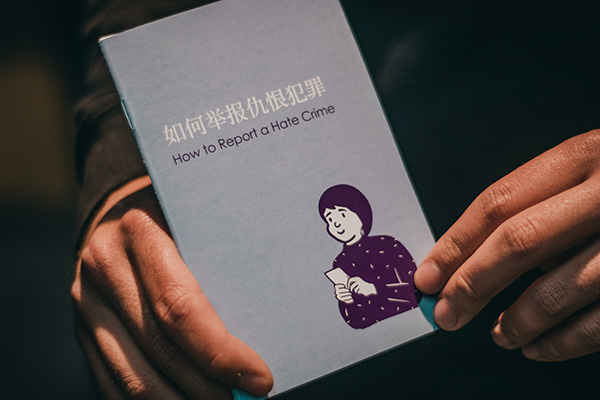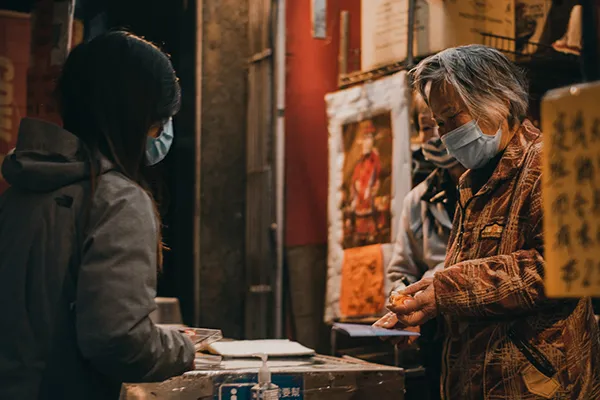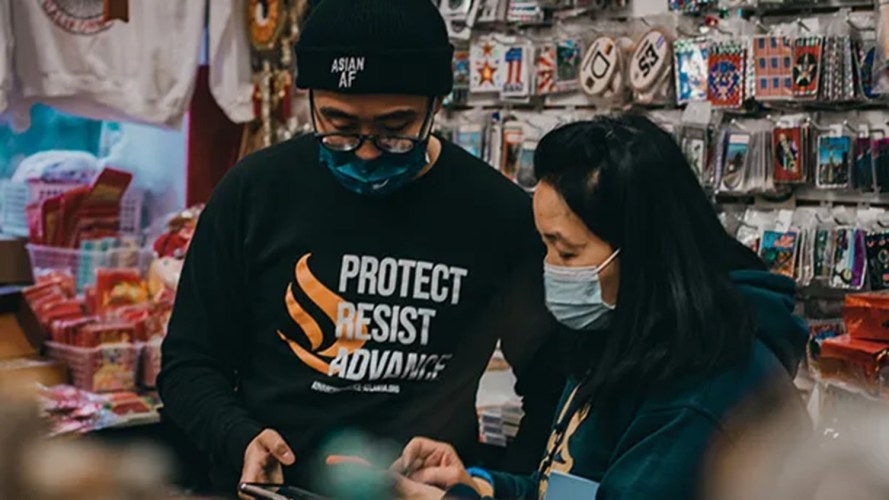Last month at my family’s Lunar New Year dinner, I recited our usual new year greetings:
- Gong hei faat choy – Wishing you a prosperous year
- Sun nin fai lok – Happy New Year
- Sun tai geen hong – Wishing you good health
- Maan see yu yee – Wishing you everything positive and good
In that exact order every year for the last 26 years, I’ve always offered these blessings to my family as a routine gesture. However, this year — as hate crimes against Asian American and Pacific Islander (AAPI) communities and anti-Asian COVID-19 rhetoric spike — I find myself pleading that these words stay true for my family and community.
Members of our AAPI communities are terrified, hurting, and frustrated at the threat of physical violence, with countless elders violently attacked and murdered in the past year and Georgia’s recent mass shooting where eight people were killed, six of whom were Asian women. Not only are people concerned for their physical safety, they are also experiencing immense mental and emotional distress.

This perpetual fear cannot continue. I was born and raised in suburban Chicago to immigrant parents from Hong Kong. Most of my extended family immigrated to Chicago Chinatown and have called it home for the past 50 years. Currently living in San Francisco and unable to travel due to COVID precautions, I feel trapped, unable to be with them during these particularly scary times. Unwilling to sit by and watch, I took action in my local community by patrolling San Francisco Chinatown with Asians in America, Inc. to deter violence and crime.
In addition to individual action, there is great power in turning to my Salesforce.org community for support. We at Salesforce.org ask our allies to be leaders against AAPI racism. Our technology empowers nonprofits and educational institutions to create an endless circle of good. Knowing our colleagues and customers share the common goal to make the world a better place, here are three meaningful things we can do now to take action together.
1. Learn the History of Asian Racism to Understand Present-Day Intersectionality
Asian racism runs deep through Asian American history—from Asian labor in the Gold Rush to the Chinese Exclusion Act of 1882 and World War II Japanese internment camps to the 1982 murder of Vincent Chin. Learning the history of Asian Americans provides a better understanding of how these historical issues have greatly impacted both how Asians are perceived as well as their lived experiences in present-day America.
Fabricated societal hierarchies placed on us, such as being labeled “the model minority” — a harmful myth used to divide minority groups and to create the illusion that Asians do not experience the same degrees of hardship as other minorities — have only made it more difficult for our voices to be heard.
This long-rooted history of racism and stereotyping has conditioned AAPI’s unwillingness to ask for help: Asian Americans are the racial group least likely to reach out for help and are roughly three times less likely than whites to seek mental health help. Asian Americans also tend to get lumped into a single group, but the Asian American diaspora is multifaceted and ever changing.
How does this intersect with the struggles of the Black, indigenous, and people of color (BIPOC) community, gender inequality, and more? Because the model minority myth created a false pecking order of identities. We cannot discuss the AAPI experience without discussing its intersectionality with other minorities as well.
This long-rooted history of racism and stereotyping has conditioned AAPI’s unwillingness to ask for help: Asian Americans are the racial group least likely to reach out for help and are roughly three times less likely than whites to seek mental health help. Asian Americans also tend to get lumped into a single group, but the Asian American diaspora is multifaceted and ever changing.
How does this intersect with the struggles of the Black, indigenous, and people of color (BIPOC) community, gender inequality, and more? Because the model minority myth created a false pecking order of identities. We cannot discuss the AAPI experience without discussing its intersectionality with other minorities as well.
2. Offer Support & Empower Your Asian Colleagues
Supporting our AAPI community can start with something small, such as learning how to pronounce your Asian colleagues’ names. Regardless of race, our names are the core of our individual identities. However, people from all ethnicities pick arbitrary English names because it’s “just easier on everyone.”
By calling your coworkers by their given name, it tells them that you respect them, their work, and their diverse points of view. This is just step one in creating a healthy, equal environment.
If you are a people leader, take your support to the next level by finding ways to uplift minority voices and career development. Constantly reflect on how you assign work, promote, and coach: Are your tactics and processes fair and equitable for all contributors to your team?

3. Be an Active Ally & Give Back
As AAPIs finally stand up to have their voices heard, there are multitudes of new and growing nonprofits striving to end Asian hate. As nonprofits, fundraising and advancement are core means to keeping their missions alive. From chaperoning elders to reporting anti-Asian hate crimes to intervening as an effective bystander. Please take the time to volunteer your time, skills, or money to nonprofits working to dismantle Asian racism.
Here are some recommended organizations to consider supporting:
- Stop AAPI Hate: The Stop AAPI Hate reporting center tracks and responds to incidents of hate, violence, harassment, discrimination, shunning, and child bullying against Asian Americans and Pacific Islanders in California and, where possible, throughout the United States.
- Compassion in Oakland: Compassion in Oakland provides Oakland Chinatown with resources for promoting safety and community through elder chaperoning and community outreach.
- Advancing Justice — Asian Law Caucus is the nation’s first legal and civil rights organization serving low-income Asian Pacific American communities with a focus on housing rights, immigration rights, labor, and employment issues.
- Asian Mental Health Project: The Asian Mental Health Projects strives to dispel the belief that struggling with mental health is a weakness and to provide resources that are accessible to all.
- Anti-Defamation League: ADL is a global leader in exposing extremism and delivering anti-bias education, and is a leading organization in training law enforcement.
Team Earth has landed
We believe that business is the greatest platform for change, and success should be for everyone on Earth and the planet itself. Because the new frontier? It’s right here.



In the wake of the acts of violence against the Asian American community, Salesforce.org stands with Asian American and Pacific Islanders in solidarity to fight injustice and hatred of any kind. Our nonprofit, education and philanthropic customers have long been at the frontlines of creating a fair and equitable world where people of Asian descent have served as leaders, philanthropists, role models, academics, educators, administrators, students, staff and changemakers. We see you and we hear you. We will use our voices and our platform to educate, support, and advocate for change.




























